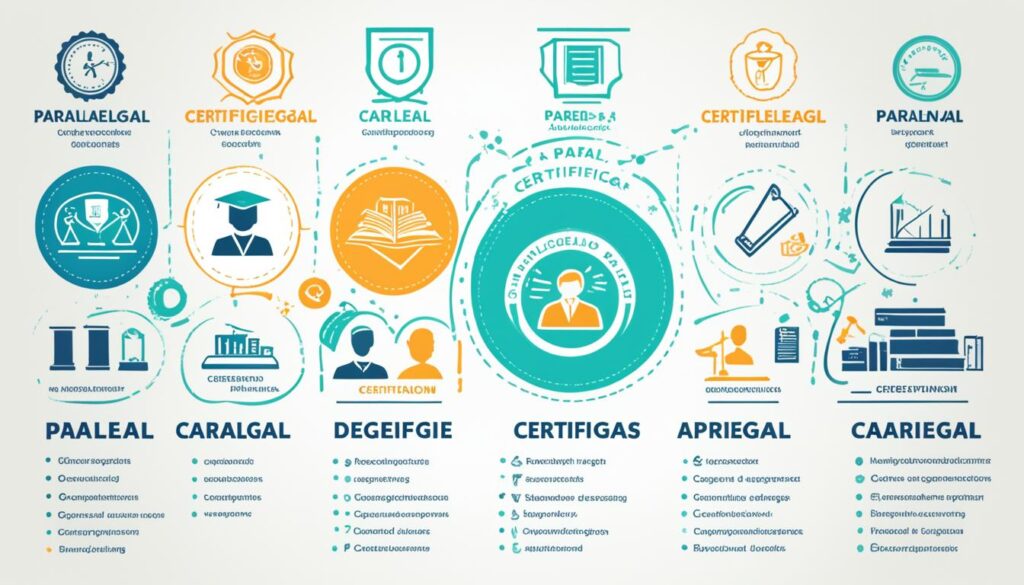Working as a lawyer can be fun and hard at the same time. Paralegals play a big role in law firms these days. This guide will help you start your job as a paralegal, whether you’re new or switching careers.
A paralegal job might be perfect for people who like how complex U.S. law is and want to help lawyers. People who know about this job say it’s great for folks who pay attention to details and enjoy writing.
Margaret Phillips, a lawyer who runs and teaches paralegal studies at Daemen College in New York, says that to do well as a paralegal, you need to be good at understanding what you read and writing. These are super important skills to work on.
“Reading and writing a lot is the best thing you can do,” Phillips said in an email. “Sure, knowing legal words and how courts work is good, but you can learn that stuff in a paralegal program. It’s way harder to fix problems with reading and writing skills, and those skills are super important for learning and doing legal work.”
Thomas E. McClure, who runs legal studies and teaches as an associate professor at Illinois State University, points out that being exact is key in the paralegal field because the job is technical.
“So, if you’re someone who likes to paint with broad strokes, this job might not be for you. It involves a ton of nitty-gritty work, and being super careful about the small stuff matters,” he points out.
Paralegals do a lot of writing, so if you’re more comfortable talking to people than putting words on paper, you might want to look into other jobs, according to McClure. He’s also in charge of the American Bar Association’s group that gives the thumbs-up to paralegal programs.

Main Points : How to Become a Paralegal
- Know what paralegals do and why they’re needed in law offices
- Check out what you need to learn to become a paralegal, like getting a two-year or four-year college degree
- Find out how to become a paralegal, from getting hands-on practice to getting certified
- Learn about different jobs and special areas paralegals can work in
- See what you need to do to get certified as a paralegal in Maryland
Understanding the Role of a Paralegal
Paralegals play a key role in the legal world. They lend a hand to lawyers with lots of tasks. They have an impact on how well law firms and legal teams run.
Responsibilities and Duties of Paralegals
Paralegals help lawyers in many ways. Here are some of their main jobs:
- They do legal research and look into cases to help out.
- They write and double-check legal stuff, like contracts and court papers.
- They keep client files straight and make sure everything’s filed.
- They chat with clients and witnesses to get crucial info.
- They lend a hand in court by getting things ready and helping with show-and-tell.
- They make sure messages get passed between clients, lawyers, and other legal folks.
The Importance of Paralegals in the Legal Field
Paralegals play a big role in making the legal system tick. They take on a bunch of tasks, which lets lawyers zero in on the heavy-duty legal choices. Their knack for digging up info and keeping things in order helps legal work run without a hitch.
Also, having good paralegals can save clients money. This makes it easier for people and businesses to afford legal help.
“Paralegals are the unsung heroes of the legal profession providing invaluable support and enabling attorneys to deliver exceptional service to their clients.”
In the end, paralegals play a key role in the legal world. They handle many jobs that assist lawyers and improve how the legal system works.
Educational Requirements for Becoming a Paralegal
People who want to become paralegals have two main options. You can get an associate’s degree in paralegal studies or go for a bachelor’s degree in paralegal studies or something similar. Both choices have their good points and stuff to think about.
Associate's Degree in Paralegal Studies
An associate’s degree in paralegal studies works well for folks who want to jump in . This two-year program teaches you about legal stuff like how to research, write, and analyze things. You’ll also learn about how civil cases work criminal law, and the rules for contracts.
Once you finish, you’ll have the basic know-how to work as a paralegal in lots of different legal places.
Bachelor's Degree in Paralegal Studies or Related Field
A bachelor’s degree in paralegal studies or a similar area can give you a more in-depth education. This four-year program digs deeper into how the legal system works. You’ll learn about complex topics like the laws in the Constitution how court cases work, and the rules lawyers have to follow.
Many of these degree programs also let you do internships. These give students a chance to see what the job is like and to meet people who might help them get jobs later.
No matter which degree you pick, you’ll need to be good at looking things up writing, and figuring stuff out. You also need to be careful not to miss small details. The rules for becoming a paralegal can be different depending on where you live. So, make sure to check what the rules are in the place where you want to work.

How to Become a Paralegal
Picking a career as a paralegal is a smart move. It opens up lots of doors in the world of law. You can find work in places like California, Texas, or other states. We’ll walk you through the main steps to kick off your journey as a paralegal.
Educational Requirements
First things first, you need to get the right schooling. Most folks go for an associate’s degree in paralegal studies. This takes about two years to finish. Another option is to shoot for a bachelor’s degree in paralegal studies or something similar. Going this route gives you a deeper understanding and might lead to more job options down the road.
Gaining Practical Experience
Real-world experience matters a lot. Many programs have internships. These allow you to learn from legal experts and build relationships. Also, entry-level jobs can boost your skills and create a solid career foundation.
Obtaining Paralegal Certification
A paralegal certificate proves you’re committed to your job. You can get one through groups like NALA or NFPA. You’ll need to pass a test and keep learning new things.
If you follow these steps and put in the effort, you can begin a rewarding career. You’ll assist the legal system and help lawyers to serve their clients better.
Step | Description | Timeline |
1. Education | Pursue an associate’s or bachelor’s degree in paralegal studies | 2-4 years |
2. Practical Experience | Participate in internships and seek entry-level paralegal positions | Variable |
3. Certification | Obtain a paralegal certification through NALA or NFPA | Variable |
“Becoming a paralegal is a rewarding career path that offers numerous opportunities in the legal field.”
Gaining Practical Experience
To be a good paralegal, you need to get your hands dirty. Internships and starter jobs help you use what you learned in class. You jump into the legal world and pick up skills as you go.
Internships
Internships give you a shot to team up with experts in the field. You’ll see what they do day in and day out. You’ll pick up skills like legal research writing docs, and chatting with clients.
These gigs also help you build a network. This can open doors to jobs down the road.
Entry-Level Positions
After you finish school and do some internships, start looking for starter jobs. These roles let you keep improving your skills. You’ll be part of a legal crew and do stuff like sorting files and helping with research.
Internships | Entry-Level Positions |
|
|
Hunting for internships and starter jobs is a clever idea. It gives you a chance to gain the know-how and practice you need. This sets you up to thrive in the legal world and chase your goal of becoming a paralegal.
“Gaining practical experience is essential for aspiring paralegals to develop the necessary skills and knowledge to excel in the legal field.”

Obtaining Paralegal Certification
Earning a pro paralegal certificate can make you shine. It proves you know your stuff. This bit will cover the different certificates up for grabs, what you gotta do to snag them, and why they’re a big plus for you.
The Certified Paralegal (CP) certification stands out in the legal field. The National Association of Legal Assistants (NALA) offers it. To get this, you need specific education and work experience, plus you have to ace a tough exam. Having this certification shows you’re committed to your career.
You can find other certifications too. The National Federation of Paralegal Associations (NFPA) provides the Paralegal Advanced Competency Exam (PACE). The National Association of Legal Assistants and Paralegals (NALA) offers the Certified Legal Assistant/Certified Paralegal (CLA/CP). Each certification has different requirements so choose one that matches your career plans and workplace.
How Much Paralegals Make and Job Prospects
The federal Bureau of Labor Statistics says paralegals and legal assistants in the U.S. had a median salary of $50,940 in May 2018. The bureau thinks these jobs will grow by 12% from 2018 to 2028. This is way more than the 5% average growth expected for all U.S. jobs.
Paralegals have been in high demand for a while now. Phillips points out that law firms are giving paralegals work that used to be for lawyers to do.
“Law offices have tried to be more competitive and work better since the recession hit. This has changed who does what on legal teams,” she explains. “Paralegals have had good job prospects since then.”
Phillips says she gets more requests from employers wanting to hire paralegals than she has students and graduates looking for jobs in her paralegal program.
Also, companies that aren’t law firms, like banks and insurance companies often want to hire people with paralegal degrees. “They know how valuable legal training is,” she points out.
Phillips says that employers have started to see the value paralegals bring to the workplace as more paralegal programs have popped up.
Debra R. Geiger, who’s in charge of the American Association for Paralegal Education and runs the paralegal studies department at Savannah Technical College in Georgia, points out that there’s a growing need to hire paralegals who know their way around legal tech.
“This covers stuff like keeping client files safe, submitting court papers online digital detective work, and finding and saving electronic proof,” Geiger, a lawyer, said in an email. “Some of the best-paying jobs are in this area.”
Gaye Weintraub, who used to be a paralegal in Texas and now helps students plan for college and careers, says she enjoyed her paralegal work.
“I knew being a paralegal would suit me perfectly because I like everything about the law,” she said in an email. “I’d say someone who wants to become a paralegal should love the law.”

How a Paralegal's Job Is Different From a Lawyer's
A paralegal’s duties change based on how much work the lawyer they work for gives them. But, a paralegal writes letters and papers that their boss’s lawyer can check, fix if needed, and okay.
Paralegals often have to keep files on different law clients organized and up-to-date. They might also get sworn statements and other official documents to use as proof in court cases. They sometimes handle scheduling for a law office and act as a go-between for lawyers and their clients. They also keep track of due dates and make sure they’re met.
Bita Goldman, who works as the global general counsel for Unidays Inc., has hired paralegals throughout her career. Unidays Inc. is an app for phones that helps students find and get discounts from different brands. Goldman wrote in an email that paralegals “are the operational brain unit of the legal department. They support attorneys by doing legal research preparing briefs, and organizing everything needed for trials.”
However, paralegals can’t do everything in the legal field because they’re not lawyers and don’t have a license to practice law.
“Paralegals can’t do some stuff that lawyers can do … Paralegals can’t speak for clients in court or depositions,” McClure says. “Just a lawyer can stand up for someone there. Paralegals can’t make deals with clients or set how much to charge. lawyers can do that. And most importantly, a paralegal can’t give legal advice. lawyers can. Now, paralegals can talk to clients and get info, but they can’t share what they think.”
Another big difference between paralegals and lawyers is that lawyers have more power to make choices and use their judgment, McClure says.
How to Become a Paralegal
Here's what you need to do to start a career as a paralegal:
. Complete a paralegal degree program
You’ve got a bunch of choices for paralegal schooling, from quick certificates to fancy degrees. A paralegal program teaches you about digging up info, following the law’s rules talking like a pro, and how the legal world works. You might even get to focus on specific parts of the law or how things are done. No matter what program you pick, make sure the American Bar Association (ABA) gives it a thumbs up before you sign up. Check out these options based on what you’ve learned so far and where you want your career to go:
• Paralegal certificate program: Getting a paralegal certificate is the quickest way to become a paralegal. It takes under a year to finish. This might be the best choice if you’ve already worked in the legal field, like as a legal secretary.
• Associate degree in paralegal work: While you can find a job with just a certificate, you might want to go for an associate degree instead. It gives you a deeper understanding of the field. This degree could be helpful if you’re new to the whole legal world and don’t know much about it yet.
• Bachelor’s degree in paralegal studies: Some paralegals go for bachelor’s programs to move up in their jobs. You might also think about getting a bachelor’s in paralegal studies if you’ve already done some college classes.
• Master’s degree in legal studies: A master’s in legal studies can help paralegals land higher-up jobs, like working for big-shot law firms. You might also go for a master’s degree to gain experience as a paralegal while you work toward a related job, like an HR manager or someone who negotiates contracts.
Related: FAQ: What is a Paralegal Studies Degree? (Plus 5 Jobs You Can Pursue)

2. Earn professional paralegal certification
You can get certified as a professional paralegal after working for at least a year. While it’s not required, getting certified might help you land better jobs and make employers trust you more. To get certified, you have to take tests about laws and stuff, or meet certain requirements based on your schooling and work experience. Here are some common ways to become a certified paralegal:
• Certified Paralegal (CP): Paralegals like the Certified Paralegal certification because the ABA and lots of groups see it as a normal credential. To get CP certified, you need to take a test. This test looks at a bunch of important stuff for paralegals, like how the US legal system works, planning estates being ethical, and different kinds of law. These include things like contracts, business law, and criminal law.
• Professional Paralegal (PP): The PP certification test has four parts. It checks if you know a lot about law and can do tough legal tasks. The test covers how to communicate better advanced law topics legal steps and ethics, and legal tech stuff.
• American Alliance Certified Paralegal (AACP): The AACP is a special certification for paralegals who qualify. To get it, you need at least five years of experience working as a paralegal. You also need to have one of these: a certificate, an associate degree, or a bachelor’s from a school that the ABA approves. Another option is to have a certificate or degree from a school that can vote in the American Association for Paralegal Education.
Want to know more? Check out: 6 Paralegal Certifications To Think About (With FAQs)
3. Choose a specialty
Paralegals can get jobs in lots of places, like private law firms, banks, insurance companies real estate firms professional trade groups, and corporate legal departments. You can also find work in the public sector, including federal and state government agencies, community legal services, consumer groups, and public defenders’ or prosecutors’ offices. To focus your career and narrow your job hunt, it’s a good idea to look into some specialty practice areas. Here are some fields you might want to explore as a paralegal:
• Business and corporate law
• Contract Administration
• Real estate
• Health care
• Intellectual property
• Compliance
• Litigation
• Personal injury
• Estate planning
• Trusts
Related: 22 Types of Law You Can Look Into (With Jobs and What They Do)

4. Complete an internship at a law firm
Think about doing an internship to get skills you can put on your resume. This can help you get some experience in a law office, which employers looking for paralegals like. A lot of paralegal students do internships near the end of college or right after they graduate if they’ve got a bachelor’s degree or higher. You might find paralegal internships at your college job center, by talking to people you know, or by looking at job posts online. Related: How To Land a Law Internship in College
5. Write a paralegal resume
When you’re set to look for starter paralegal jobs, putting together a focused resume that shows off your best qualifications can help you catch the eye of employers. Paralegals write key legal papers, so being good at writing and checking for mistakes is super important. Show that you’re careful by making sure your resume is clear and has no errors. You might also look at the job ad to add important words, like legal computer programs you know how to use, or job skills like looking up legal info and talking to clients. Related: Tips to Write a Good Paralegal Resume Objective
6. Interview for positions
The interview can be a big deal when you’re trying to get a paralegal job. When you’re talking to potential employers, try to bring up times you’ve managed big projects before. Sharing stories about meeting tough deadlines and helping busy teams can show off your skills. Be ready for questions that check how well you can make decisions and follow ethical rules.

Advancement opportunities
If you want to make more money as a paralegal, you might want to look for ways to move up at work. Here are some ways paralegals could get promoted, along with how much they might earn. Keep in mind that some of these jobs might need more schooling:
FAQ In : How to Become a Paralegal
What are the responsibilities and duties of a paralegal?
Paralegals assist lawyers with lots of legal stuff. They research laws, get documents ready, chat with clients, and lend a hand in court. They’re super important in the legal world helping things go without a hitch.
What are the educational requirements to become a paralegal?
To become a paralegal, you can get an associate’s or bachelor’s degree in paralegal studies. An associate’s degree takes two years to complete. A bachelor’s degree takes four years to finish. Both degrees get you ready for paralegal work.
How long does it take to become a paralegal?
How long to become a paralegal depends on your schooling. An associate’s degree lasts two years. A bachelor’s degree takes four years. Some paralegals also get a professional certificate, which needs more time.
What are the requirements for paralegal certification in Maryland?
To become a certified paralegal in Maryland, you must complete an approved program. You also have to pass a national test and keep learning. Look up the current rules in Maryland.
How do I become a paralegal in California or Texas?
To be a paralegal in California or Texas, you need to do the normal stuff. This means getting the right schooling working in the field, and maybe getting a special certificate. But remember, each state has its own rules you gotta follow.
What are the benefits of earning a professional paralegal certification?
Getting a pro paralegal certificate makes you better at your job and shows you know your stuff. It can help you land cooler jobs make more money, and move up in your career. A lot of bosses want or need you to have this certificate for certain gigs.
How do I write an effective paralegal resume?
When you’re putting together a paralegal resume zero in on your schooling, job history, and any special abilities or certificates you’ve picked up. Show that you’ve got a handle on legal lingo, can dig into legal research and write well, and know your way around legal paperwork. Make sure to point out how detail-oriented you are, your knack for solving problems, and your solid communication skills.








